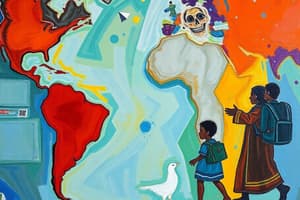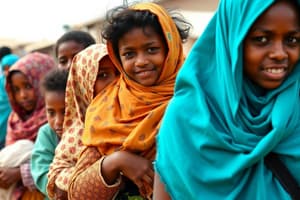Podcast
Questions and Answers
The allure of United States graduate programs for talented individuals globally is minimal, playing a negligible role in international migration patterns.
The allure of United States graduate programs for talented individuals globally is minimal, playing a negligible role in international migration patterns.
False (B)
An individual who enters a country with a valid visa and departs before its expiration is typically classified as an illegal migrant.
An individual who enters a country with a valid visa and departs before its expiration is typically classified as an illegal migrant.
False (B)
Contemporary migration is primarily motivated by leisure and recreational travel, driven by an increasing desire for global tourism experiences.
Contemporary migration is primarily motivated by leisure and recreational travel, driven by an increasing desire for global tourism experiences.
False (B)
While economic factors are a driver for migration, climate change events such as rising sea levels and extreme weather have little to no impact on human migration patterns.
While economic factors are a driver for migration, climate change events such as rising sea levels and extreme weather have little to no impact on human migration patterns.
Forced migration never occurs on a large scale.
Forced migration never occurs on a large scale.
Labor migration occurs when individuals relocate within their own country to seek new employment opportunities in different industries.
Labor migration occurs when individuals relocate within their own country to seek new employment opportunities in different industries.
Climate change migration refers exclusively to international movement of people displaced by extreme weather, and never includes relocation within a country’s own borders.
Climate change migration refers exclusively to international movement of people displaced by extreme weather, and never includes relocation within a country’s own borders.
Individuals facing persecution based on their preferred sports team are likely to migrate in search of safety.
Individuals facing persecution based on their preferred sports team are likely to migrate in search of safety.
The Northern Triangle countries are seeing reduced crime rates due to successful government interventions, leading to less emigration.
The Northern Triangle countries are seeing reduced crime rates due to successful government interventions, leading to less emigration.
Economic migrants typically move from wealthier regions to developing areas, seeking lower costs of living.
Economic migrants typically move from wealthier regions to developing areas, seeking lower costs of living.
Seasonal economic migration refers exclusively to agricultural workers following crop cycles.
Seasonal economic migration refers exclusively to agricultural workers following crop cycles.
Environmental displacement is always a voluntary movement of people seeking scenic landscapes.
Environmental displacement is always a voluntary movement of people seeking scenic landscapes.
Crop failure leading to food scarcity and job losses is not typically a driver of migration.
Crop failure leading to food scarcity and job losses is not typically a driver of migration.
Social factors influencing migration are solely related to financial gains, such as higher salaries.
Social factors influencing migration are solely related to financial gains, such as higher salaries.
Migration decisions are often influenced by the desire to secure improved educational opportunities for children.
Migration decisions are often influenced by the desire to secure improved educational opportunities for children.
Flashcards
Illegal Migration
Illegal Migration
Entering or remaining in a country without legal authorization.
Uninspected Entry
Uninspected Entry
Entering a country without undergoing immigration inspection.
Fraudulent Entry
Fraudulent Entry
Entering a country using false documents or claims.
Visa Overstay
Visa Overstay
Signup and view all the flashcards
Economic Migration
Economic Migration
Signup and view all the flashcards
Climate Migration
Climate Migration
Signup and view all the flashcards
Labor Migration
Labor Migration
Signup and view all the flashcards
Migration
Migration
Signup and view all the flashcards
Migration due to Safety Factors
Migration due to Safety Factors
Signup and view all the flashcards
Persecution and Discrimination
Persecution and Discrimination
Signup and view all the flashcards
Environmental Migration
Environmental Migration
Signup and view all the flashcards
Crop Failure Migration
Crop Failure Migration
Signup and view all the flashcards
Migration due to Social Factors
Migration due to Social Factors
Signup and view all the flashcards
Educational Migration
Educational Migration
Signup and view all the flashcards
Study Notes
- Migrants and refugees are people who leave their homes for various reasons, seeking a better life.
Safety Factors
- Safety concerns can drive migration due to dangers to individuals.
- Persecution and discrimination based on nationality, race, religion, political beliefs, or group membership can cause migration.
- People seek safer locations with more freedom, away from war or gang activity.
- In 2016, Guatemala, Honduras, and El Salvador, known as the Northern Triangle, was one of the most violent regions in the world.
- These countries have high crime rates by local and international gangs, often unpunished.
- An estimated 10% of the Northern Triangle's population has already left due to extreme violence, with more expected to flee.
Economic Factors
- Economic reasons are frequently cited for migration.
- People migrate from poorer to richer areas for higher wages and more jobs.
- People also move from rural to urban areas for more competitive opportunities.
Environmental Factors
- Migration due to environmental factors is increasingly involuntary.
- Environmental factors lead to displacement or forced movement due to social or environmental issues.
- Crop failure can cause food scarcity and a drop in agricultural jobs.
- People move to areas with better job opportunities and climate.
- Pollution of water, air, and soil in urban and rural areas creates health risks, pushing people to seek better lives.
Social Factors
- Social factors for migration stem from the desire to improve quality of life.
- Migrants seek better opportunities for themselves and their families.
- This includes better education, safer schools, and jobs with good salaries, benefits, and career prospects.
- U.S. graduate programs attract talented individuals for education.
- People also migrate for services like life-saving surgery and medical treatment unavailable at home.
Illegal Migration
- Illegal migration involves entering or staying in a country without legal permission, also called illegal or undocumented immigration.
- Examples of illegal migration:
- Entering a country without immigration inspection.
- Entering a country with an expired visa.
- Entering a country fraudulently.
- Crossing a border improperly.
- Staying in a country after a visa expires.
Contemporary Causes of Migration
- Primary causes:
- Economic factors like better employment and higher wages.
- Environmental issues like climate change.
- Climate change leads to droughts and floods.
- Political persecution.
- Armed conflict.
- Family reunification.
- Access to better education.
- People migrate to improve their quality of life by escaping hardship and seeking better prospects.
Key Points About Migration Causes
- Economic factors are often the most significant driver.
- People move to areas with higher paying jobs, better business opportunities, or to escape poverty.
- Climate change events like rising sea levels, droughts, and extreme weather force people to leave home and migrate to safer areas.
- Persecution, human rights abuses, and armed conflict lead to large-scale forced migration as people seek asylum.
- Family reunification is a major driver, where people move to join family members already in another country.
Specific Examples of Migration Causes
- Labor migration: Moving to a new country to work in a specific industry with high labor demand.
- Brain drain: Highly skilled professionals leaving their home country for better opportunities abroad.
- Refugee migration: People fleeing war or persecution and seeking asylum in another country.
- Internal migration: Movement within a country, often due to economic disparities between regions.
- Climate change migration: People displaced from their homes due to extreme weather events caused by climate change.
Studying That Suits You
Use AI to generate personalized quizzes and flashcards to suit your learning preferences.




